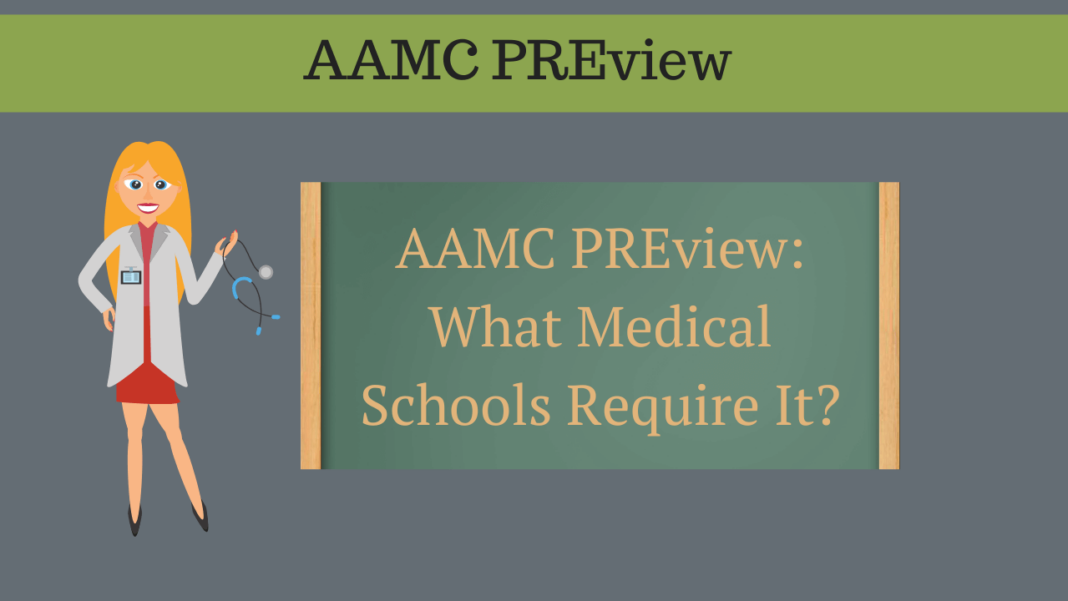Medical students are no strangers to standardized testing. Yet another exam facing future doctors, the AAMC PREview professional readiness exam asks test takers to evaluate possible responses to a series of hypothetical scenarios they may encounter while attending medical school. The goal is to assess students’ understanding of proper behavior across eight core competencies and ensure they’re prepared for life in a med school program.
Formerly called the AAMC Situational Judgment Test, the AAMC was developed in collaboration with school faculty, admissions officers, and student and diversity affairs officers. Proctored live, the test is administered online through the AAMC’s third-party vendor, Yardstick. Although the AAMC is fairly new to the med school testing scene, experts anticipate that it will play a significant role in medical school admissions moving forward. It may replace Casper in the future.
To that end, it pays for students to familiarize themselves with the test as well as what’s expected of them. Read on to learn more about this professional readiness exam and discover how it could affect your chances of becoming a physician in the coming years.
What Medical Schools Require AAMC PREview?*
Keep in mind that even though the AAMC sent out a blast email in mid January, 2023 about Preview, the medical schools requiring the test during the 2023-2024 application cycle have not yet been announced so in our opinion this was premature and caused unnecessary anxiety for applicants.
AAMC PREview Purpose
As a prospective med student, you might be wondering how this exam varies from others you’ll face while preparing for a career in medicine. Unlike other tests, the AAMC PREview exam focuses specifically on eight of the 15 core competencies for medical school applicants. In particular, the test evaluates applicants to determine whether they have the requisite pre-professional knowledge in the following areas:
Service orientation
Social skills
Cultural competence
Teamwork
Ethical responsibility to self and others
Reliability and dependability
Resilience and adaptability
Capacity for improvement
Balancing out more academic measures like grades and MCAT scores, the AAMC PREview helps screen students prior to the interview stage. A strong score can increase a student’s likelihood of acceptance, while a low one may push them to the back of the applicant pool.
AAMC PREview Effectiveness Ratings
To succeed on the AAMC PREview exam, it’s important to understand how the structure and scoring work. If you’re planning to sit for the test, expect to see various written scenarios showcasing hypothetical dilemmas for medical school students. For example, you may answer questions set in a healthcare environment, educational setting, or out in the real world. While you don’t need medical or technical knowledge to answer the questions effectively, you will need to utilize your best judgment in determining the effectiveness of various behavioral responses.
During the exam, test takes will rate dilemmas using the following four-point scale:
1 – Very ineffective. This ranking suggests that the response to the problem will make the situation worse or cause additional issues.
2 – Ineffective. This ranking indicates that the response will not improve the issue.
3 – Effective. Responding this way might help but not in a significant way.
4 – Very effective. This response will dramatically improve the problem.
In some scenario sets, students might use a particular ranking once, more than once, or not at all. Each exam features 30 scenario sets and 186 items. Test takers have 75 minutes to finish the assessment.
AAMC PREview Scoring and Reporting
To score the AAMC PREview exam, evaluators compare a student’s effectiveness ratings with those from a panel of med school professors. Test takers earn full points if their rating matches the medical educators’ response. They receive partial credit if their rating is close to the educators’ response.
After all questions have been reviewed, students receive a score ranging from 1 (the lowest) to 9 (the highest), as well as a percentile score indicating how they performed compared to other test takers. For exams scored between June and October of 2021, the average score was 4.73. A score of 4 represented the 43rd percentile. A 9 represented the 100th percentile. Scores are sent automatically to your target institutions, with the AAMC retaining a copy for future use.
Preparing for the AAMC PREview
It’s natural to feel stressed at the prospect of taking the AAMC PREview Exam. After all, the test could impact your chances of being accepted to your dream medical school. Fortunately, there are steps you can take to familiarize yourself with the main competencies being evaluated and improve your ability to respond quickly and accurately. Here are some tips for prepping for the AAMC successfully.
Review the AAMC PREview Guides
The first step in preparing for the exam is to review the AAMC PREview Essentials Guide. Along with conveying policies and procedures for taking the exam, the guide helps familiarize students with the test format and scoring system. Additionally, the guide offers details on how to register for the exam and what technical requirements there are for taking the test. If you want to view sample scenarios and access additional advice, you should also review the Examinee Preparation Guide.
Understand the Competencies
One of the best ways to ensure optimal performance on the AAMC PREview exam is to spend time reviewing the eight competencies the test addresses. Test takers should consider what characteristics and qualities are important for being a good medical student or doctor. The goal is to internalize the competencies so they’ll be front of mind when you take the exam.
When practicing for the exam, students should review sample scenarios and practice different ways of analyzing the dilemmas. First, test takers should strive to identify the competencies being evaluated. Next, students should assess what legal or ethical issues come into play. Then, try to determine which person or group of people is vulnerable in the situation. Then, consider how each response will affect the individuals involved. Finally, students should aim to avoid rushing to judgment and stay open minded while answering the questions.
Taking the Practice Exam
Once you’ve reviewed the test guides and competencies, it’s time to take the official practice exam. Along with sample questions, the practice test features a scoring key and explanations, so you know why the educators ranked answers a particular way. Students can also take the official AAMC PREview exam tutorial, which is made available to test takers once they’ve registered. As a bonus, the tutorial will familiarize you with the software, so you aren’t confused on the day of the test.
Those students seeking more help with test prep may want to consult with medical students or doctors currently working in the field. Find a trusted friend and mentor and talk through the competencies so you’re comfortable answering questions on test day.
AAMC Preview Dates 2023
| Window | Test Dates | Registration Opens | Registration Closes | Scores Released |
|---|---|---|---|---|
| 1 | March 16 & 17 | Open | March 2 | April 18 |
| 2 | May 10 & 11 | Open | April 26 | June 13 |
| 3 | June 14 & 15 | Open | June 1 | July 18 |
| 4 | July 12 & 13 | Open | June 28 | August 15 |
| 5 | August 16 & 17 | Open | August 2 | September 19 |
| 6 | September 13 & 14 | Open | August 30 | October 17 |
| 7 | October 11 & 12 | Open | September 27 | November 9 |
AAMC Preview Cost 2023
The AAMC Preview test costs $100.
About MedEdits
MedEdits helps students get admitted to medical school and residency programs. Our consultants have years of experience serving on medical school admissions committees, and as faculty members at the top medical schools in the country.
Need Help With Your Medical School Application?
Schedule a Free 15 Minute Consultation with a MedEdits expert.








